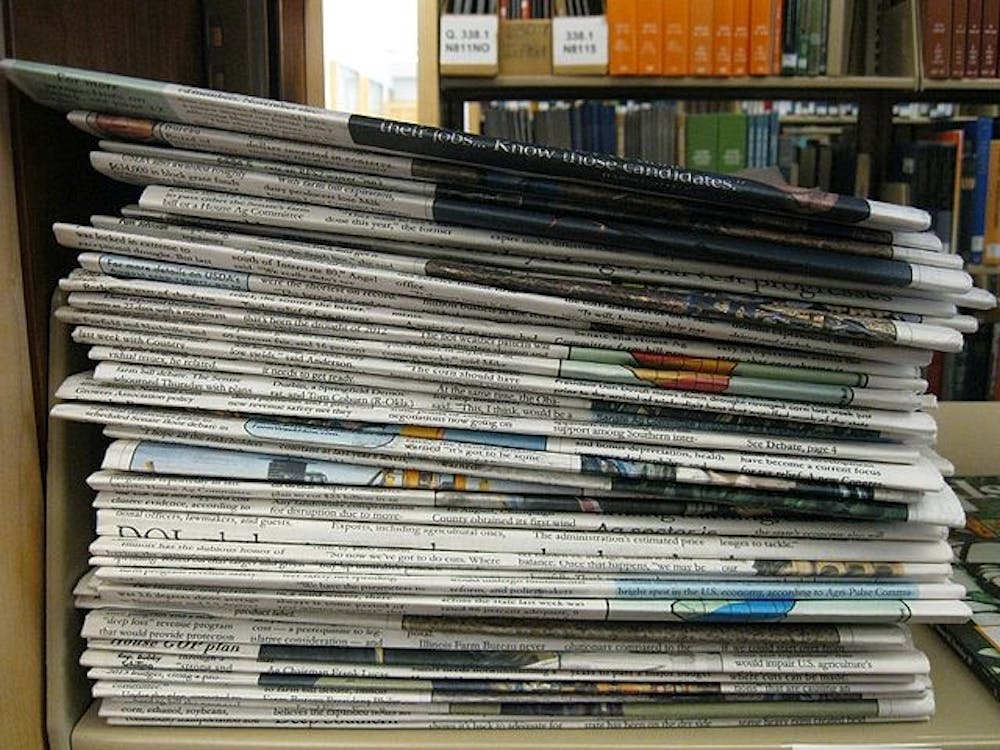To those readers who are familiar with the University’s Grounds, the words, “And you shall know the truth, and the truth shall make you free,” may carry some significance. This powerful verse is inscribed in Greek over the facade of Old Cabell Hall, its prominent position and central location serving as a reminder of the ultimate goal to which our University is dedicated 一 the pursuit of truth. This is undeniably a lofty aim, but one which has served students well as we seek to go out into the world and truly make a positive difference. However, it is extremely easy to stray from our goal, as we often look to support our presuppositions rather than chase objective truth.
Journalists may be more guilty of this than anyone. A profession to which truth is especially integral, investigative journalists carry the heavy burden of disseminating facts and thereby often influencing what people know. They hold in their hands the power to shift narratives and change paradigms. Unfortunately, they are becoming increasingly prone to neglection of their primary duty 一 to find the truth and to share it. In their handling of many current global and national issues, investigative journalists have not lived up to the high standards of objectivity to which they are bound. They have used their unique ability to disperse knowledge for misguided purposes 一 such as underpinning their own personal and often partisan opinions 一 rather than for the enlightenment of others.
A very pertinent example of this negligence can be found in media coverage of the origin of the COVID-19 virus 一 a topic which is almost certainly one of the most important issues investigative journalists have dealt with in recent times. This is not only due to the scientific ramifications of the virus’ origin but also significant cultural ones. We have seen all too clearly the impact which unfairly placing blame for this catastrophic event can have 一 most notably through those entities who have sought to sow hate against Asians across the world by unjustly using them as a scapegoat. However, within a complex web of half-truths, gross exaggerations and flat-out lies spun by these institutions lay a very plausible theory about the origin of COVID-19. This Lab Leak Hypothesis was considered a fringe conspiracy theory by the vast majority of investigative journalists until recently, when it was rather abruptly picked up by mainstream news outlets and explored in detail many months after its inception. This perplexing about-face raises many interesting questions about the current integrity of investigative journalism in our nation. It also reflects on the immense impact which the profession can have on the way our society perceives current events.
The problem of the Lab Leak Hypothesis and its subsequent controversies are endemic of a widespread issue within the journalism industry 一 one that continues to worsen with each piece of dishonest or misinformed reporting published. Mainstream media outlets are being forced to retract statements with increasing frequency, and every time they do so their reputations are tarnished further. The example of the Lab Leak Hypothesis illustrates just how easy it is for even the best investigative journalists to be sucked into perpetrating ad hominem attacks when faced with information from divisive sources, instead of evaluating it honestly regardless of preconception. It is their duty to rise above such narratives and distinguish the truth from the lie, even when that means placing aside their own preconceived notions in pursuit of objectivity. As evidenced by a widespread and irrational dismissal of the Lab Leak Hypothesis 一 as well as countless other instances of journalistic malpractice 一 investigative journalists are increasingly prone to failure at this task. I would assert that above all, political partisanship and personal bias are the cause of this negligence, and that the solution is twofold.
Firstly, an increased recognition of the solemn responsibility which journalists have is necessary. The investigative journalist should be able to overcome a fear of clashing with the status quo. If this means presenting unpopular opinions and causing controversy, so be it. Only by stepping up to the plate on this issue can investigative journalists begin to repair their broken relationship with their readers — the efforts of a select few are not sufficient. Instead, the entire industry must make a concerted endeavor to collectively recognize that their ultimate responsibility is not to their political party, personal opinions or employer, but to the truth.
The second element is where we, as students at the University, come into play. The pursuit of truth is the responsibility of not only future journalists, but each and every one of us. Though the University does not have an official motto, the words inscribed on the entrance gate at The Corner are the closest thing to it. They are an excerpt from a letter written by Thomas Jefferson to William Roscoe, and they read “For here we are not afraid to follow truth wherever it may lead, nor to tolerate any error so long as reason is left free to combat it.” We must live by these words, and above all, seek to be bold in our pursuit of truth. Only then can we inspire the change necessary to put an end to the demise of investigative journalism and what it should stand for.
Thomas Laughridge is an Opinion Columnist for The Cavalier Daily. He can be reached at opinion@cavalierdaily.com.
The opinions expressed in this column are not necessarily those of The Cavalier Daily. Columns represent the views of the authors alone.







